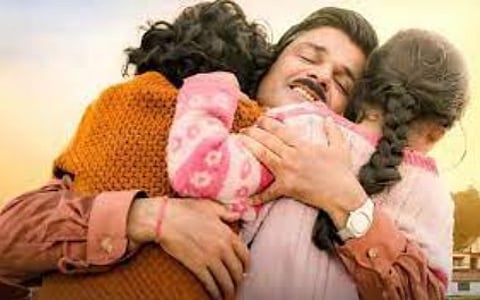Movie Review: ‘Tikdam’ encourages us to pause and reflect
In the shadows of linguistic intrigue, the Hindi word Tikdam lurks, a sinister whisper of deception and trick.
With Chiya and Chiku, our 7-year-old twins, we saw Tikdam, a film that’s such an innocent picturisation of several complex issues from the lens of children. Set against the picturesque hill town of Sukhtaal, the movie unfurls before us a tapestry of ‘tikdams’ that the children try to stop their father from migrating. With masterful storytelling, it weaves together the threads of climate change, loss of livelihoods, and the heart-wrenching reality of forced migration.
Someone wise said ‘No statistical evidence can reveal the pain what eye can see, and heart can feel’. Indeed, if one were to place all the research reports on climate change and migration on one side of a cosmic scale, and Tikdam on the other, the film would undoubtedly tip the balance.
The protagonist, Prakash (Amot Sial), is a widower who works at a hotel in the hill town known for tourists. The hotel is about to be closed as snowfall, the main tourist attraction is gone. His children, Cheeni (Aarohi Saud) and Samay (Arisht Jain) are heartbroken at the thought their father migrating for work to a distant city.
“हमें बस पापा चाहिए कपड़े खिलोनो जूतो से ज्यादा” (“We just need our father, more than clothes and toys”) is the running plea that children have. The purity and resolve of the children touched us profoundly as we witnessed their ordeal scene after scene. We could relate to their heartfelt plea, which got us thinking about what’s essential in life and what people give up for their families to make ends meet.
The film masterfully balances its weighty themes with moments of levity that provide welcome comic relief. One particularly memorable scene showcases this blend of humor and profundity through a charming exchange between the grandmother and her grandchild, Samay. The grandmother, to dissuade ‘Samay’, poses a rhetorical question in Hindi: “अगर तुम्हारा दोस्त कुएं में कूदेगा तो क्या तुम भी कूद जाओगे?” (“If your friend jumps in a well, will you do the same?”) This common parental admonition against peer pressure takes an unexpected turn when the child innocently replies: ”बिलकुल, उसे डूबने से बचाएगा कौन?” (“Yes, I will. Else who will save him from drowning?”)
Hoping that Samay and his friend Bhanu (Divyansh Dwivedi) would do something to stop deforestation and pollution, we watched with bated breath while children try several innocent tikdams to enable “बर्फ गिराओ, पापा लाओ” (“Make the snow fall to bring back Papa”).
The film serves as a vivid reminder of the urgent need to decentralise work and create job opportunities in rural areas and smaller towns to reduce distress migration. As we witness the collapse of public infrastructure during monsoons, endure the choking air quality of winter, and experience the relentless heat of summer, it becomes painfully clear that we are teetering on the edge of a crisis. Unviable rental costs and very long commute are a true reality for majority who move from smaller towns to metros.
Every place has its natural limits, and our cities are no different. Viewing these challenges solely through an economic lens might serve profit interests, but it falls short of addressing the needs of people and the planet.
When you watch this film with family, I encourage you to pause and reflect. Are we, in our own small ways, contributing to these issues, or are we actively working to foster local livelihoods in rural areas and smaller towns?
“जिंदएी है ये खेल, एक प्यारे तू कभी जीते तू कभी हारे” (“Life is a game that you sometimes win and sometimes lose”).
I hope it will have the same uplifting effect on others as it did on me, so I recommend this film to my loved ones.
Sharda Gautam, PhD Scholar, is a development practitioner. Views expressed are personal

